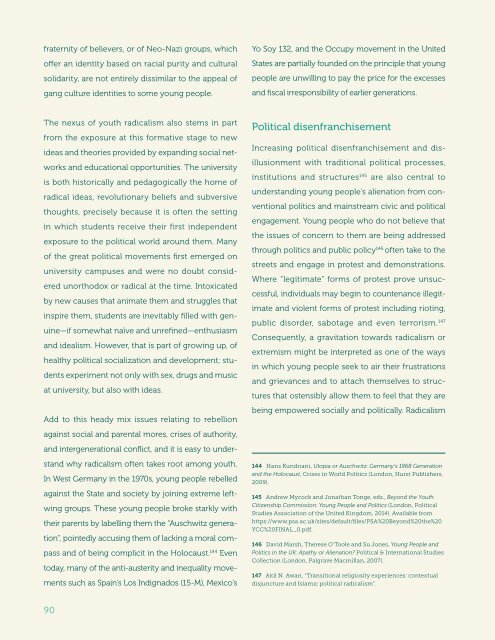YOUTH CIVIC
JieguI2U
JieguI2U
You also want an ePaper? Increase the reach of your titles
YUMPU automatically turns print PDFs into web optimized ePapers that Google loves.
fraternity of believers, or of Neo-Nazi groups, which<br />
offer an identity based on racial purity and cultural<br />
solidarity, are not entirely dissimilar to the appeal of<br />
gang culture identities to some young people.<br />
Yo Soy 132, and the Occupy movement in the United<br />
States are partially founded on the principle that young<br />
people are unwilling to pay the price for the excesses<br />
and fiscal irresponsibility of earlier generations.<br />
The nexus of youth radicalism also stems in part<br />
from the exposure at this formative stage to new<br />
ideas and theories provided by expanding social networks<br />
and educational opportunities. The university<br />
is both historically and pedagogically the home of<br />
radical ideas, revolutionary beliefs and subversive<br />
thoughts, precisely because it is often the setting<br />
in which students receive their first independent<br />
exposure to the political world around them. Many<br />
of the great political movements first emerged on<br />
university campuses and were no doubt considered<br />
unorthodox or radical at the time. Intoxicated<br />
by new causes that animate them and struggles that<br />
inspire them, students are inevitably filled with genuine—if<br />
somewhat naïve and unrefined—enthusiasm<br />
and idealism. However, that is part of growing up, of<br />
healthy political socialization and development; students<br />
experiment not only with sex, drugs and music<br />
at university, but also with ideas.<br />
Add to this heady mix issues relating to rebellion<br />
against social and parental mores, crises of authority,<br />
and intergenerational conflict, and it is easy to understand<br />
why radicalism often takes root among youth.<br />
In West Germany in the 1970s, young people rebelled<br />
against the State and society by joining extreme leftwing<br />
groups. These young people broke starkly with<br />
their parents by labelling them the “Auschwitz generation”,<br />
pointedly accusing them of lacking a moral compass<br />
and of being complicit in the Holocaust. 144 Even<br />
today, many of the anti-austerity and inequality movements<br />
such as Spain’s Los Indignados (15-M), Mexico’s<br />
Political disenfranchisement<br />
Increasing political disenfranchisement and disillusionment<br />
with traditional political processes,<br />
institutions and structures 145 are also central to<br />
understanding young people’s alienation from conventional<br />
politics and mainstream civic and political<br />
engagement. Young people who do not believe that<br />
the issues of concern to them are being addressed<br />
through politics and public policy 146 often take to the<br />
streets and engage in protest and demonstrations.<br />
Where “legitimate” forms of protest prove unsuccessful,<br />
individuals may begin to countenance illegitimate<br />
and violent forms of protest including rioting,<br />
public disorder, sabotage and even terrorism. 147<br />
Consequently, a gravitation towards radicalism or<br />
extremism might be interpreted as one of the ways<br />
in which young people seek to air their frustrations<br />
and grievances and to attach themselves to structures<br />
that ostensibly allow them to feel that they are<br />
being empowered socially and politically. Radicalism<br />
144 Hans Kundnani, Utopia or Auschwitz: Germany’s 1968 Generation<br />
and the Holocaust, Crises in World Politics (London, Hurst Publishers,<br />
2009).<br />
145 Andrew Mycock and Jonathan Tonge, eds., Beyond the Youth<br />
Citizenship Commission: Young People and Politics (London, Political<br />
Studies Association of the United Kingdom, 2014). Available from<br />
https://www.psa.ac.uk/sites/default/files/PSA%20Beyond%20the%20<br />
YCC%20FINAL_0.pdf.<br />
146 David Marsh, Therese O’Toole and Su Jones, Young People and<br />
Politics in the UK: Apathy or Alienation? Political & International Studies<br />
Collection (London, Palgrave Macmillan, 2007).<br />
147 Akil N. Awan, “Transitional religiosity experiences: contextual<br />
disjuncture and Islamic political radicalism”.<br />
90


